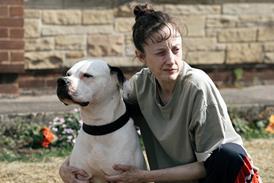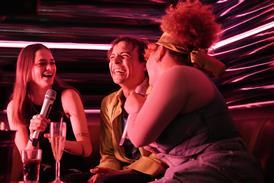Robert Zemeckis’ Flight has the feel of a 1970s drama, the budget of an indie film and the box-office trajectory of a sleeper hit. John Hazelton speaks to Zemeckis and stars Denzel Washington and Kelly Reilly.
There is no easy formula for turning a modestly budgeted, morally ambiguous film like Flight into a box office hit and awards contender.
But part of the trick may be in putting the right talents together at the right time.
There is certainly something intriguing about the coming together on Paramount’s dramatic thriller of seasoned US star Denzel Washington, rising UK actress Kelly Reilly and versatile, hit-making director Robert Zemeckis.
It was Washington who first read John Gatins’ script about a conflicted airline pilot and he reacted strongly enough to eventually defer part of his fee for playing the central part of Captain Whip Whitaker.
“I knew it was a good script that was not typical big studio fare,” says the two-time Oscar-winning actor, “and they were real clear that they weren’t spending $100m, or $50m [the film actually cost around $30m]. The last five or so years I’ve been going back to the stage and doing theatre and you do that for even less money. So if it’s something you really want to do you just do it.”
The possible involvement of Zemeckis, an experienced pilot himself, sweetened the deal, says Washington: “I was ecstatic when I heard he was interested and then I heard on top of that he was a pilot.”
Zemeckis, another Oscar-winner, who since his 2000 Tom Hanks box office hit Cast Away had been making motion-capture films, was also sufficiently drawn to take a reduced up-front payment.
“The main thing was the complexity of Denzel’s character,” says Zemeckis of what attracted him to the project.
“I loved all the moral ambiguity that was in the screenplay and I was struck by the fact that there weren’t any conventional storytelling devices used and yet the piece was continuously dramatic. I just kept turning pages wanting to find out what was going to happen to this guy. I thought this could be a very amazing piece. For me it was a real challenge to try to make sure I could pull the story off.”
Reilly, best known up to now for a string of UK and European films including Guy Ritchie’s Sherlock Holmes and its sequel, came on board later to play Nicole, a recovering substance abuser who Whip befriends.
“I was touched by the journey of someone trying to survive,” says Reilly of her role, secured in the face of stiff competition after she submitted two audition tapes and took a trip to Los Angeles to meet Zemeckis and Washington.
“It’s written with so much nuance. It’s almost like she was underwritten. She’s described in the film as a ghost and that’s who she is until she starts to get better.”
Zemeckis admits “my first choice was not to look for an English actress” to play Nicole. “But [Reilly] just had the character down.”
Lift off
Both actors put in time researching their roles, with Reilly learning about heroin addiction and Washington working with a flight instructor. Washington also became involved in rewriting the script, working with Gatins and Zemeckis as part of the process of finding his character, whose initial act of heroism in the story is complicated by his substance abuse issues.
“Short of Shakespeare you always work on a script,” Washington says with a grin. “John and Bob and I sat in a room many, many times. Then you find out new things when you’re reading with people auditioning or watching tapes.”
The process continued through pre-production discussions with Zemeckis.
“Many days prior to shooting we would sit in the hotel conference room all day long and deconstruct this character and get under his skin,” the director recalls. “We just talked about it, every scene, every moment.
“And then I’d do the same thing with the entire cast for days before shooting,” Zemeckis continues. “I don’t do line readings or anything, just a very, very elaborate table discussion. That’s where we worked it all out. Then when we get on the set the actors have to go wherever they go to find those moments.”
During production, Zemeckis put his experience with effects-aided action to use on the extended sequence in which Whip pulls his plane out of a terrifying dive and crash-lands it in a field.
“The trick to any film illusion or action sequence is to mix it up,” the director says of his approach to the film’s impressive airborne scenes. “So we had everything: a real set that we could turn upside down, cameras that we could rotate on a third axis and digital effects helping us along. We used all the tricks that we had to make it work.”
But Zemeckis was also aware of the need to give his actors the space and confidence to do their best work on a tight 45-day shooting schedule.
“That was my biggest concern,” he says. “It’s obviously a dramatic piece so you want to have as much time for the cast as you can. But they were great. They were prepared, they made it work.”
The actors praise Zemeckis for his focused but unfussy on-set demeanour.
“He’s just very passionate, very trusting of his own instincts,” says Reilly of the director of her first fully US film. “He knew what he wanted and as an actor I always want to work with people like that. If I sense weakness in a director I get worried. Because you really want to follow someone off a cliff.”
Washington attributes the film’s success in part to the deft touch of its director. “I was excited when Bob got on,” says the star, “because I know he makes films that people want to go see. In the wrong hands it could have been too dark and too heavy.”
The combination of Washington’s screen presence, Reilly’s freshness and Zemeckis’ touch appear to have paid off for Flight in critical kudos and box-office dollars (the film had garnered $86.2m in North America by Dec 9 and still has most of its international openings to come).
And it could pay off for the individual participants as they move on to future projects. Washington has already completed Baltasar Kormakur’s action drama 2 Guns and is considering “one or two” possible directing projects (he previously directed Antwone Fisher in 2002 and The Great Debaters in 2007).
Reilly, now based in New York, has already completed four more films, including French production Chinese Puzzle and John Michael McDonagh’s Irish drama Calvary.
Zemeckis says that he hasn’t thought about his next project yet (the motion-capture remake of Yellow Submarine that he has been linked with is no longer on the cards). But he is hopeful Flight’s success might create more demand for the kind of well-written screenplays that are, he says, “few and far between”.
Flight, says its director, “is the kind of movie that no one’s supposed to go see. But it’s the kind of movie that I love, the kind of movie I grew up on in the seventies. I’m glad people are going to see it because now there’s hope we could do a complex adult drama that isn’t a pre-sold title.”




















No comments yet